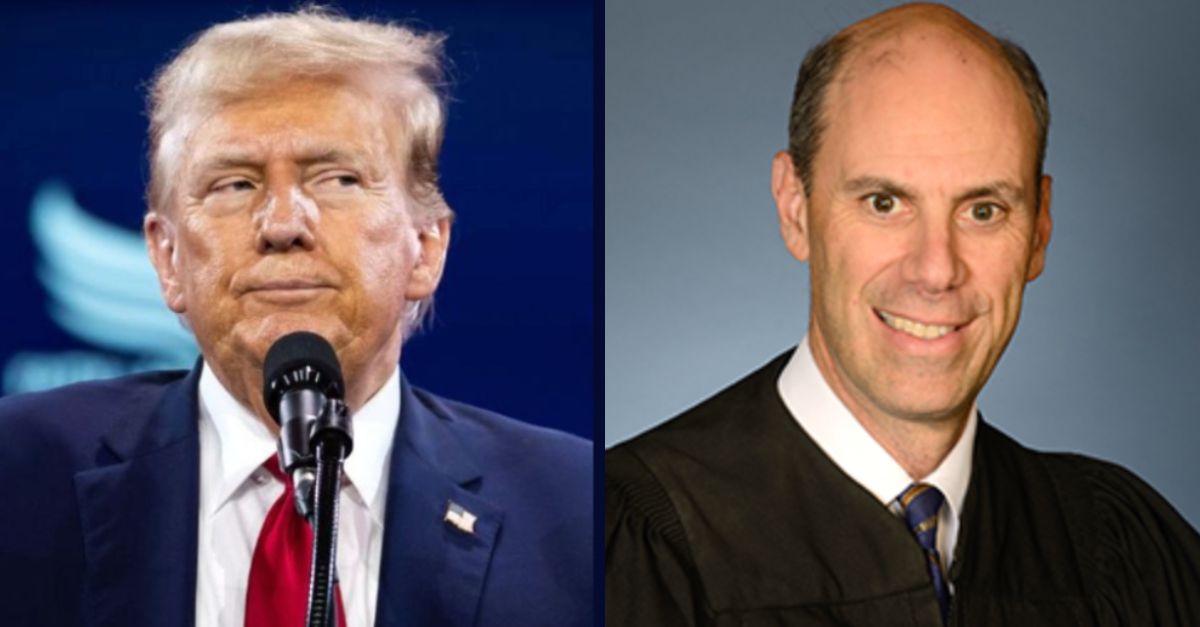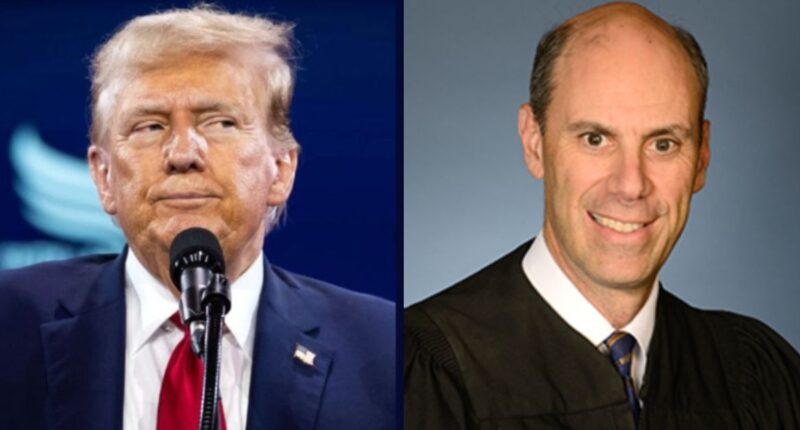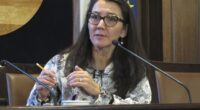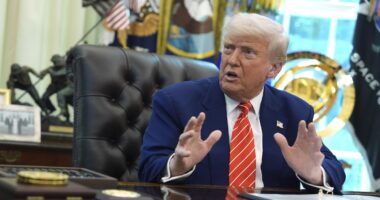
Left: Donald Trump speaks at the annual Road to Majority conference in Washington, DC, in June 2024 (Allison Bailey/NurPhoto via AP). Right: U.S. District Judge James Boasberg (U.S. District Court for the District of Columbia).
The federal judge who has been dealing with the Trump administration concerning mass deportations of Venezuelans under the Alien Enemies Act of 1789 (AEA) and the alleged disregard of his shutdown orders criticized a Justice Department lawyer extensively during a hearing. The judge, U.S. District Judge James Boasberg, interrogated the lawyer for an hour, raising questions and comments about the case and even issuing warnings about potential contempt charges.
During the hearing, U.S. District Judge James Boasberg openly described the Justice Department’s actions as “pretty sketchy.” He expressed dissatisfaction with the Department’s argument that certain details about the Trump deportation flights couldn’t be disclosed to him, even in a classified setting and under seal.
“If I don’t agree, if I don’t find your legal arguments convincing and I believe there’s probable cause to find contempt, what I’m asking is how should I determine who the contemnor or contemnors are?” Boasberg asked Deputy Assistant Attorney General for Immigration Litigation Drew Ensign, who was arguing on behalf of the DOJ.
The American Civil Liberties Union (ACLU) has asserted in court filings that the Trump administration’s deportation of more than 100 Venezuelans under the obscure 18th-century wartime AEA power last month directly violated federal court orders, and the government’s subsequent invocation of the state secrets privilege to withhold information from Boasberg — who has simply been inquiring as to whether his orders were followed — is based on assertions that are not even “remotely true” and should be rejected.
The Trump administration, so far, has invoked the AEA to justify its mass deportations of members of one particular Venezuelan gang. In the executive order underlying the litigation, Trump called for the removal of “all Venezuelan citizens 14 years of age or older who are members” of Tren de Aragua (TdA), which has been designated as a foreign terrorist organization since January.
On March 15, the ACLU sued for and won a temporary restraining order. Action has since been quick, steady, and tense. Boasberg’s original oral bench ruling to stop the removals under the auspices of the AEA, which included a directive to turn planes around containing Venezuelan immigrants, was allegedly ignored, with the government claiming that the flights had already left U.S. airspace and were therefore outside of the court’s jurisdiction.
On Monday, the ACLU urged Boasberg to deny the Trump administration’s invocation of the privilege, contending that it has never been invoked to stymie a court’s inquiry into whether its own orders had been followed. Should the privilege be permitted to stand, the ACLU alleges, it would effectively give the administration free rein to conceal evidence from courts at will.
More from Law&Crime: ‘Muzzling the Executive’: Trump admin says order targeting Hillary Clinton-linked law firm is ‘straightforwardly legal’ in seeking dismissal of lawsuit
The court demanded additional details about the flights and was repeatedly stonewalled with filings that Boasberg described as “intemperate and disrespectful” before the administration invoked the state secrets privilege, asserting that the court did not need any additional information to make a decision.
At Thursday’s hearing, Boasberg assessed the government’s willingness to share information about the timing of the deportations.
“It’s pretty sketchy looking, mainly about why it couldn’t be shared with the public,” Boasberg said. “What I’m trying to figure out here is, is there any other inference that there was an expedited effort to get people on planes before my hearing at 5 p.m. or before I ruled?” the judge asked. “Is that the inference you would draw from this?”
Tearing into Ensign repeatedly, Boasberg said, “It seems to me, there is a fair likelihood that … the government acted in bad faith throughout that day. If you really believed everything you did that day was legal and could survive a court challenge, I can’t believe you ever would have operated the way you did.”
Going after the Trump administration’s alleged refusal to recognize his order, Boasberg told Ensign, “Let me ask you this: Why, when you knew that I was having a hearing at 5 p.m. that was going to relate to class certification, that was going to relate to the plaintiff’s attempt to join action against the larger class, why wouldn’t the prudent thing be to say, ‘Let’s slow down here. Let’s see what the judge says. He’s already enjoined the removal of five people, it’s certainly in the realm of possibility that he would enjoin further removals. Let’s see what he says and if he doesn’t enjoin it we can go ahead, but sure better to be safe than to risk violating the order.’ Why wouldn’t the prudent, considered route be that?”
Ensign insisted that the Trump administration didn’t have notice that the 5 p.m. hearing on March 15 was going to be on anything other than class certification; he said he didn’t have any other “operational” details besides that.
“So what you were willing to do, by trying to do this as quickly as possible and avoid being enjoined by the court, was to risk putting people on those planes who shouldn’t have been on the planes in the first place,” Boasberg said. “We have the example of Mr. Kilmar Abrego Garcia and you’ve admitted, haven’t you — not you personally, but the administration — has admitted that he was removed based on error, right?”
Ensign confirmed the wrongful removal of Garcia, a Maryland resident who was sent to El Salvador, but tried justifying it by claiming Garcia was on the third plane in question, “for which there are no compliance issues that have been raised by plaintiffs.”
Boasberg said, “On the contrary, they’ve raised them, we haven’t quite gotten to the bottom of the third (plane) yet.”
Circling back to the removal of Garcia, Boasberg said: “In that group of passengers for three planes that you’re rushing to get out of the country before a judge can act, and low and behold, at least one — that we know of — shouldn’t have been there in the first place.”
What seemed to have Boasberg taken back most Thursday was how Ensign and the DOJ claimed to have no knowledge of what the Trump administration was doing with the flights when he asked them at the 5 p.m. hearing on March 15.
“I asked you point blank whether there were any removal under this proclamation planned in the next 24 or 48 hours, remember that?” Boasberg asked Ensign, to which he said he did.
“And you said you didn’t know, but that you could investigate and report back … So I recessed the hearing from 5:22 p.m. to 6 p.m. and when we came back you still couldn’t give me any information about the plane,” Boasberg recalled. “So what I want to know here, as an officer of the court, you’re telling me that you had no knowledge whatsoever between 5 p.m. and 6 p.m. on that day that planes were in the air or shortly would be in the air? With no knowledge whatsoever?”
More from Law&Crime: ‘A bludgeon to suppress speech’: Student preemptively sues Trump admin over apparent plans to deport her for protests over Israel-Hamas war
Ensign claimed that he had “no knowledge from my clients” but said he did have information from plaintiffs’ submissions to the court that it may be occurring. “I can assure you, as an officer of the court, I diligently tried to obtain that information,” Ensign said.
“They told you nothing?” Boasberg fired back. “You’re arguing on behalf of the government and they told you nothing?”
Ensign repeatedly pointed to attorney-client privilege as a reason for not being able to say what was discussed between him and the Trump administration. Boasberg felt it was an unsturdy argument that didn’t apply, but Ensign pushed on anyway.
“No one told you from the administration that planes were in the air or would be within the next 24 or 48 hours, that’s what you’re telling me?” Boasberg asked.
“Yes, your honor,” Ensign said.
Boasberg spent a good chunk of time asking the DOJ lawyer who he told in the Trump administration about his verbal order on March 15 after it was given, with Ensign providing several names of officials at Homeland Security and the State Department. But when pressed on who decided not to turn the planes around with the people being deported, Ensign refused to answer, once again citing attorney-client privilege.
More from Law&Crime: ‘The president possesses no such authority’: Lawsuit pits Kavanaugh against 5th Circuit in challenge to Trump’s order that aims to ‘dictate’ new rules for national elections
Boasberg noted how the Justice Department has insisted in filings and at past hearings that the decision was “perfectly appropriate” for the Trump administration to make, so he was confused as to why Ensign couldn’t talk about it.
“So who made that perfectly appropriate decision?” Boasberg asked, to which Ensign admitted: “I don’t know that.” It was here that the judge began floating the idea of holding people in contempt.
Ensign said he believed the matter should be resolved based on the arguments presented so far, not additional briefings and proceedings.
“Your honor … assuming that you have rejected all our arguments … then I think that additional briefing, in particular … would be a better way to proceed,” Ensign told Boasberg.
The judge said that if he finds there’s probable cause for contempt, “there’s a good chance we’ll have hearings” with people being forced to testify under oath related to who will be punished and how.
Boasberg ended Thursday’s hearing by scheduling another for Tuesday, April 8, at which he’s expected to deliver his final order on whether the Trump administration unlawfully ignored him last month.
Love true crime? Sign up for our newsletter, The Law&Crime Docket, to get the latest real-life crime stories delivered right to your inbox.











